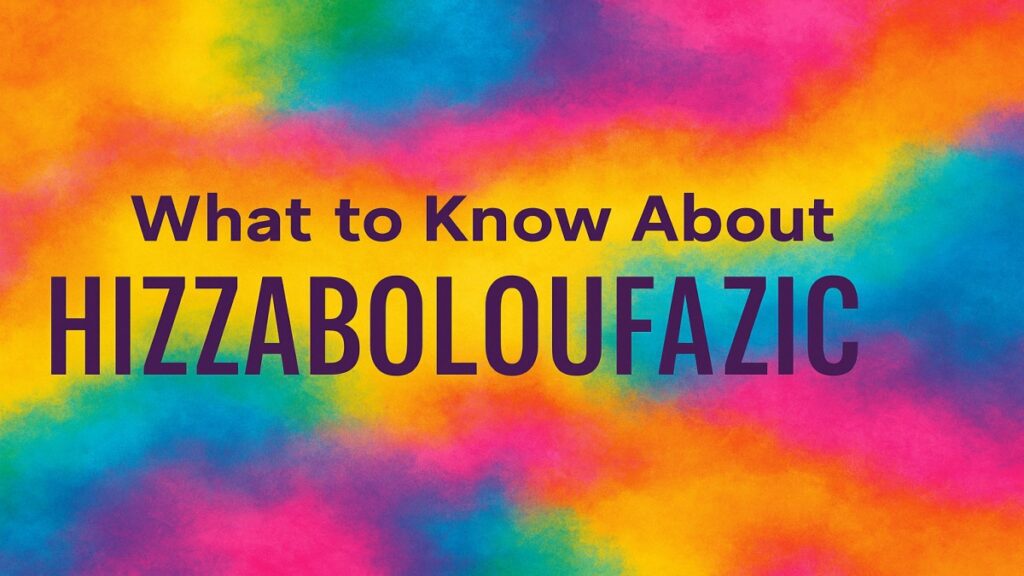Introduction to Hizzaboloufazic
What Is Hizzaboloufazic?
What to Know About Hizzaboloufazic. If you’ve stumbled upon the term Hizzaboloufazic, you’re probably scratching your head and wondering, “What on earth is that?” Don’t worry you’re not alone. Hizzaboloufazic is one of those rare, peculiar concepts that pop up in obscure texts, fringe discussions, and curious corners of the internet. It’s mysterious, elusive, and oddly captivating.
Origin and Etymology
The term appears to have no official root in Latin or Greek, which makes it especially interesting. Some believe it was coined in underground literary circles, while others suggest it may be an amalgamation of cultural words meant to evoke confusion, curiosity, and reflection all at once.
Historical Background
Early Mentions
Hizzaboloufazic first appeared in obscure philosophical writings around the late 19th century. These mentions weren’t mainstream but were found in footnotes, margin scribbles, or even as pseudonyms.
Cultural Importance
In alternative intellectual communities, Hizzaboloufazic became symbolic—almost like a banner word—for abstract, counter-mainstream thought. It wasn’t about what it meant, but how it made people think.
Core Characteristics
Unique Traits
It doesn’t follow the rules. Hizzaboloufazic is fluid. It can be a feeling, a concept, an experience, or even an artistic method. Think of it like a chameleon—it changes depending on how you interact with it.
How It Differs From Similar Concepts
Unlike traditional terms in psychology or philosophy, Hizzaboloufazic resists definition. It’s intentionally elusive, which makes it more about engagement than understanding.
Usage in Modern Context
Hizzaboloufazic in Pop Culture
Oddly enough, it’s popped up in indie films, underground zines, and abstract art exhibits. You might not recognize it unless you’re paying attention, but it’s there—lurking in symbolism or titles.
Presence in Academic Discussions
Some fringe academic communities use Hizzaboloufazic as a tool for breaking rigid frameworks. It’s not about what the term is, but what it allows a conversation to become.
Symbolism and Meaning
Interpretations Over Time
From a symbol of chaos to one of creative liberation, the meaning of Hizzaboloufazic has shifted based on who’s using it. Some see it as a key to unlocking free thought, while others view it as nonsense.
Mythical or Allegorical Representations
There are a few tales where Hizzaboloufazic is personified as a traveler between worlds, or as a creature of infinite identity. These are allegorical, meant to represent transformation and ambiguity.
Psychological or Philosophical Angles
Is Hizzaboloufazic a State of Mind?
Yes and no. Some interpret it as a mental state where logic takes a backseat, allowing abstract and unconventional thinking to take the wheel. It’s often compared to a meditative or dreamlike mindset.
Theories Surrounding Its Significance
Postmodernists love this term. To them, it challenges the rigidity of language and structure. It invites you to question reality and embrace the absurdity of perception.
Impact and Relevance Today
In Education and Thought Leadership
While not taught formally, Hizzaboloufazic has become a niche subject of interest in seminars on post-structuralism, surrealism, and alternative pedagogy.
Common Misconceptions
People often think it’s just a made-up word with no value. But that’s missing the point. Its vagueness is the value—it’s an invitation, not a conclusion.
Controversies or Debates
Conflicting Views
Some academics argue it’s all nonsense, a word made to sound smart but mean nothing. Others claim it holds deep meaning exactly because it resists definition.
Academic Skepticism
There’s skepticism, for sure. But like many fringe ideas, its worth isn’t in how many believe it—it’s in how deeply it makes you think.
Conclusion
So, what is Hizzaboloufazic? It’s a riddle, a mirror, a portal. It might not have a Wikipedia page (yet), and that’s okay. In a world that demands clarity and certainty, Hizzaboloufazic dares to be undefined. It asks you to let go of “knowing” and just feel it—whatever “it” is for you.
FAQs
Q1: What is the origin of Hizzaboloufazic?
While there’s no confirmed origin, it’s believed to come from underground philosophical texts and artistic communities.
Q2: Is it a real concept or fictional?
It walks the line. It’s used in real discussions, but its nature is abstract and borderline fictional.
Q3: How do people use it today?
In artistic, academic, or philosophical contexts—mostly to provoke thought or represent abstract ideas.
Q4: Why is it controversial?
Because it resists definition and challenges academic norms, some view it as nonsense, while others see it as brilliant.
Q5: Can Hizzaboloufazic be experienced personally?
Absolutely. Many describe moments of surreal clarity or disorientation as personal encounters with the concept.







